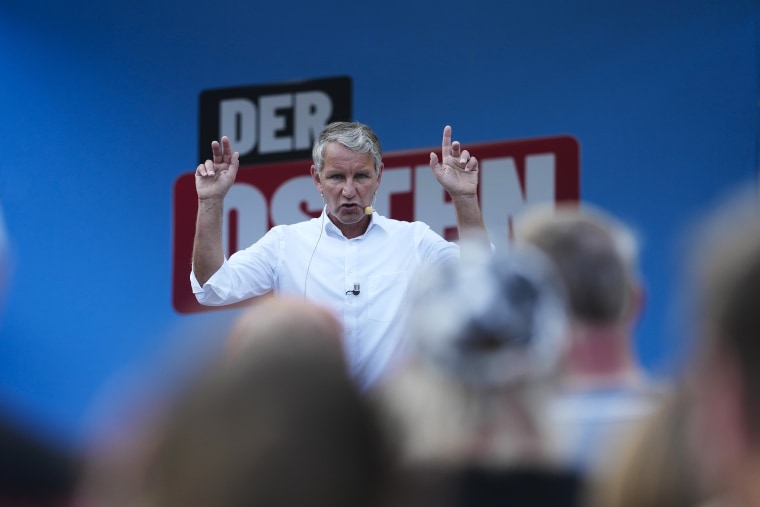Alternative for Germany far-right group on the verge of state election success
Set up in April 2013 as a movement against the euro currency, the AfD shifted its focus to Islam and immigration and has grown in popularity at both local and national levels ever since, particularly in the former East Germany, the former communist half of the country which had strong ties to the then-Soviet Union; polling has shown there is more skepticism about NATO and Germany’s support for Ukraine in its war against Russia.
In June’s European Parliament elections, the party finished second in Germany, despite a series of scandals engulfing the party in the lead-up to the vote.
The party’s top candidate Maximilian Krah was forced to withdraw from campaigning in May after telling an Italian newspaper that the SS, the Nazis’ main paramilitary force, were “not all criminals.”
One of his aides was also charged with spying for China and another candidate faced allegations of receiving bribes from a pro-Russian news portal.
But the party nonetheless gained ground, particularly among younger voters.
“The No. 1 issue is, of course, the migration topic,” David-Wilp said.
More than 1 million people benefited from then-Chancellor Angela Merkel’s decision to open Germany’s doors to asylum-seekers in 2015, making the country by far the largest European destination for refugees. But the issue of integration is a thorny one and the AfD harnessed hostility toward foreigners as it rose from the fringes.
Immigration became an even hotter issue after three people were killed and eight wounded in a knife attack in the city of Solingen last week, for which the Islamic State terrorist group claimed responsibility.
The suspect is a 26-year-old Syrian citizen, identified by the German federal prosecutor’s office as “Issa Al H,” had applied and failed to gain asylum in Germany.
It later emerged that he could have been deported to Bulgaria where he was first registered as an asylum-seeker, but authorities failed to do so, a fact that was seized upon by the AfD.

Björn Höcke, the party’s leader in Thuringia, posted on his Facebook page that “the “multicultural experiment” that has been forced upon the Germans must be stopped.” It is accompanied by the illustration of a bloody knife through the words diversity and Solingen.
Höcke was fined twice this year by German courts for using the Nazi-era slogan “Everything for Germany” at two AfD events in recent years. He has appealed the rulings.
In an apparent bid to prevent his rivals from seizing the initiative on the issue, Scholz appeared to swing rightward at a campaign event Tuesday in the Thuringian city of Jena.
“Those who commit serious crimes should also be deported to countries like Afghanistan and Syria,” he said. Anyone who does such things and who brings violence and aggression into our society has forfeited the right to protection in this country and must accept that we will use all means and levers to bring them back.”
On Friday, the German government announced that 28 Afghan nationals with criminal convictions had been flown to Afghanistan. It was the first such flight since the Taliban retook power there three years ago.
Scholz’s comments were not greeted warmly by everyone however.
Anna-Lena Metz, a pro-democracy activist in Thuringia, said Thursday that she did not believe centrist parties would be well served if they take over the narrative from right-wing parties.
“Deportations are never a solution, and we will not be able to deport the danger potential. We need a much stronger focus on social policy that includes everyone,” she said.
Metz, a spokesperson for the anti-right-wing activist group Auf die Plätze Bündnis Erfurt, was one of the organizers of an anti-right-wing demonstration Sunday in Thuringia’s state capital, Erfurt, that was attended by thousands of people.
It was similar to rallies attended by hundreds of thousands of people in cities across Germany earlier this year, after reports from the investigative news website Correctiv about a meeting of right-wing extremists, including AfD party members, in the city of Potsdam, where the deportation of people of foreign origin was discussed.
While those rallies and Sunday’s passed off peacefully, at a campaign rally in Thuringia on Thursday, a man sprayed pink at BSW’s leader Sahra Wagenknecht.
Were the AfD to win, it would be a potent signal for the party ahead of next year’s national election. But it is unclear whether any other party would be prepared to form a coalition with it to put it in power.
But Metz pointed out that many voters are still undecided ahead of Sunday’s ballot.
“At the end of the day, we are all aware that we cannot persuade convinced AfD voters to turn away from the AfD; on the contrary, we really want to reach out to people who are unsure but who still value a diverse and open society, who for some reason have existential fears that can be taken away from them and that is more our goal,” she said.
“We can do all this together and we can do it without right-wing populism.”
Carlo Angerer reported from Munich and Henry Austin from London.





